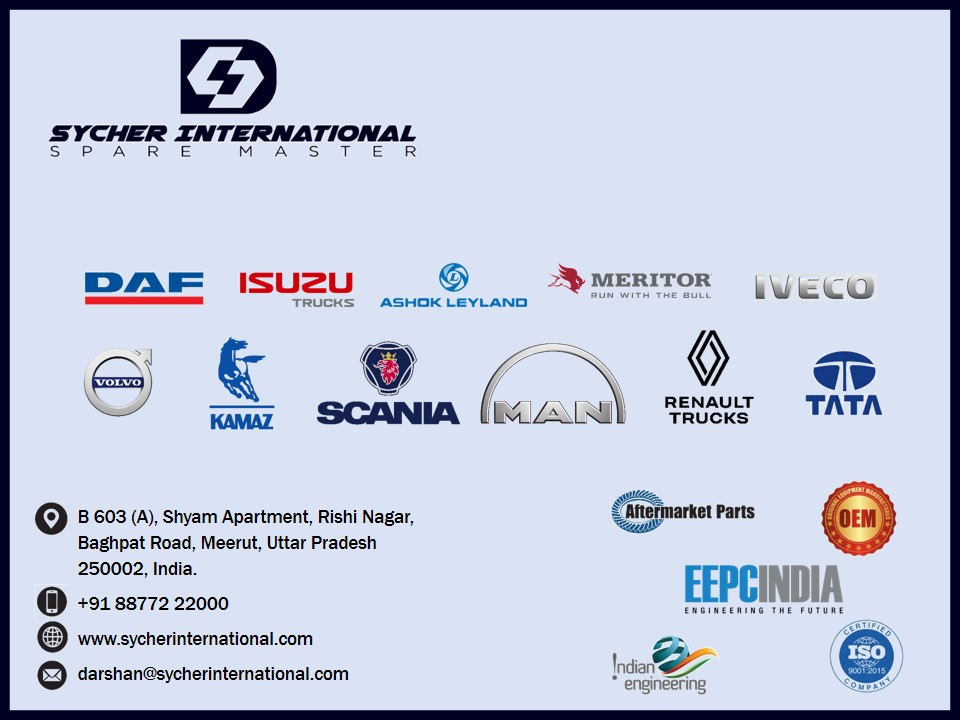What is a Volvo oil filter?
A Volvo oil filter is a part made to filter particles and other impurities out of the engine oil in a Volvo truck. The oil filter aids in preventing the circulation of impurities such as dirt, debris, and other substances that could harm the engine and impair performance. A standard Volvo oil filter for a truck is made up of a canister with an input and an outlet port as well as a filter element that collects and eliminates impurities from the oil as it passes through the filter. Volvo oil filters should periodically be updated as part of normal maintenance since they are influential in maintaining the health and longevity of the engine.

Models of Volvo truck:
Volvo FH09: Designed for long-distance travel, the FH09 is a strong and effective heavy-duty vehicle. It provides great performance and comfort for drivers by integrating a sturdy chassis, cutting-edge technology, and a variety of engine options.
Volvo FH12: The FH12 is a reputable and well-known vehicle that is renowned for its dependability and adaptability. It is appropriate for long-haul, regional, and construction applications since it offers a variety of powertrains and combinations to fulfil different transportation needs.
Volvo FM09: The FM09 is a flexible truck built for a variety of uses, including regional transportation, construction, and distribution. It offers a harmony of fuel efficiency and power, as well as driver comfort and safety features.
Volvo FM12: The FM12 is a powerful and adaptable vehicle that performs admirably in difficult construction environments and demanding transit activities. In order to handle difficult circumstances and ensure driver comfort and productivity, it offers a variety of power options and chassis configurations.
How much it is important to change your Volvo oil filter?
Changing your Volvo's oil filter on a regular basis will assist maintain your engine operating smoothly and safeguard it from harm. When pollutants are present in the oil, they might harm engine parts if they are not removed by the oil filter.
What quality of Volvo oil filter should use?
It's important to buy a high-quality oil filter for your Volvo truck that is created to adhere to the truck's criteria. You can use a filter that complies with or beyond the manufacturer's requirements for this you need to connect to the top exporter as well.
To help protect the life of your engine and to keep your truck's warranty valid, it's also essential to stick to the manufacturer’s suggested maintenance schedule for your truck, which includes oil and filter replacements.

Volvo oil filter usage in tractor
Aside from other uses, Volvo also makes powerful engines for trucks used in agriculture. In many instances, the truck's oil filter is unique to the Volvo engine that drives it.
An oil filter in a truck functions similarly to one in a vehicle. It is designed to keep the engine lubricated and running smoothly by filtering contaminants from the oil as it passes through the engine. To maintain health and prevent damage from contaminants in the oil, the engine has to have frequent oil and filter replacements.
It's important to select an oil filter that is made for heavy-duty applications and is particularly advised by the manufacturer cum exporter when purchasing one for a tractor or truck has driven by a Volvo. It's also significant to guarantee optimum efficiency and the longevity of the engine, it's also important to adhere to the truck's suggested maintenance schedule, which includes regular oil and filter replacements.
How Volvo oil filter manufactured?
A Volvo oil filter is normally manufactured during the course of several phases:
Filter media: The substance that traps impurities, or the filter media, is chosen and sized appropriately.
End caps: The end caps are designed to suit the filter media and are made of a material such as metal or plastic.
Assembly: Any necessary gaskets or seals are added, and the filter media and end caps are put together.
Impregnation: To improve the filter media's capacity to catch pollutants, some oil filters may be subjected to impregnation.
Quality control: The final filter is examined and tested to make sure it satisfies the requirements of the manufacturer.
Packing: The filter is protected in the packaging marked with the proper part number, specs, and other details.
It's important to remember that the specific manufacturing procedure may change depending on the kind and model of Volvo oil filter as well as the manufacturer.
Before purchasing how should a buyer check Volvo oil filter durability?
The kind and quality of the filter, the usage circumstances, and the manufacturer's recommendations for maintenance and replacement all affect how long a Volvo oil filter lasts.
- The majority of oil filters are typically made to endure for several months or several thousand miles of regular driving before they need to be replaced. To ensure optimal engine health, excessive use or difficult operating circumstances could call for more frequent oil and filter replacements.
- The manufacturer normally advises replacing the oil and filter on Volvo trucks every so often, like every 10,000 miles or once a year, whichever comes first. However, this period may change based on the vehicle's precise make and model, as well as the kind of driving conditions it faces.
- It is important to follow the manufacturer's advised maintenance schedule to help protect the engine's longevity and to maintain the vehicle's warranty. Additionally, using a high-quality oil filter that is made to meet or exceed the manufacturer's specifications can help to ensure maximum engine health and performance.
What are the challenges you face being a manufacturer cum merchant trader while manufacturing Volvo oil filters?
The manufacturing and delivery of Volvo oil filters may provide a number of difficulties for their manufacturers. Here are a few potential difficulties:
Competition: There is fierce competition in the oil filter market, where a wide range of trucks and their spare parts are served by numerous producers. Because of the rivalry, it may be difficult for producers to distinguish themselves and hold onto a market share.
Quality control: Strict quality control procedures are needed to produce oil filters of high quality and guarantee that each filter complies with the manufacturer's requirements. Any filter flaws or imperfections could lead to engine failure or damage, which would be expensive for both the manufacturer and the customer.
Adapting to new technologies: As engines and vehicles get more complicated, oil filter technology may need to change as well. To stay up with evolving engine technology and guarantee that their filters are functional and suitable, producers might need to make research and development investments.
Environmental laws: Environmental laws are in place in many nations to make sure that waste products from the production of oil filters are disposed of in an eco-friendly way. These rules must be followed by producers, which might raise costs and need the use of specialized knowledge and tools.

Disruptions to the global supply chain, such as those caused by calamities, pandemics, or political unrest, can have an effect on the manufacturing and distribution of oil filters, as they can in many other sectors of the economy. These interruptions may cause a lack of supplies or parts, hold up manufacturing or delivery, and raise expenses.
How Indian Volvo filters for oil are superior to those from other nations
Manufacturers of Indian oil filters, create a variety of filters that are applied to a variety of trucks, including those made by Volvo. These filters are made to adhere to the same requirements and norms as those made in other nations.
An oil filter's quality can be affected by a number of elements, such as the filter's design, manufacturing method, and filter media quality. To ensure that their filters meet strict performance and quality criteria, Indian producers and exporters always focus to employ cutting-edge manufacturing technologies.
How you can import Indian Volvo oil filters from India to the USA
Importing Indian Volvo oil filters from India to the USA involves several steps and requires compliance with various regulations and requirements. Here are some general steps to consider when importing Indian Volvo oil filters:
- Obtain necessary import permits and certifications: Before importing Indian Volvo oil filters into the USA, it is important to obtain the necessary import permits and certifications from the relevant government agencies, such as the US Customs and Border Protection (CBP), Environmental Protection Agency (EPA), and Department of Transportation (DOT).
- Ensure compliance with safety and quality standards: The Indian Volvo oil filters must meet the safety and quality standards set by the US government. To ensure compliance, the filters must undergo testing and certification by authorized testing agencies.
- Identify a reliable supplier: Identify a reliable supplier in India who can provide high-quality Volvo oil filters that meet the requirements of the US market. It is recommended to conduct a background check and verify the supplier's credentials, reputation, and quality control processes.
- Arrange shipping and logistics: Once the import permits and certifications are in place, arrange for shipping and logistics to transport the Indian Volvo oil filters from India to the USA. This may involve selecting a reliable freight forwarder, arranging for customs clearance, and complying with any shipping regulations.
- pay import duties and taxes: Upon arrival in the USA, the Indian Volvo oil filters will be subject to import duties and taxes. It is important to factor in these costs when determining the final price of the filters.
- Ensure compliance with local regulations: Once the Indian Volvo oil filters have been imported into the USA, ensure compliance with local regulations, such as labeling requirements and safety standards.